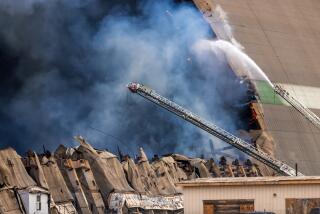Let the Public Join El Toro Discussion : * Concerns Come to Light Over Decision to Close Base
- Share via
The tortuous process of closing the El Toro Marine Corps Air Station and planning for its future is offering some lessons in process, in how to conduct vital public business.
First: One has to wonder whether the public will be served by the new Pentagon edict that reminds Navy and Marine Corps brass that they “must remain neutral at all times,” a euphemism for “keeping their mouths shut” as one Navy official put it more bluntly, in the next round of military base closings.
It is one thing for the commanders to refrain from active advocacy of one position or another. It is another for them to let the basic facts be known. Last year, Marine Maj. Gen. P. Drax Williams, commander of the base and other Marine air stations in the West, raised some very good questions about the cost-effectiveness of relocating the Marines to Miramar Naval Air Station in San Diego. If we fast-forward to 1994, we see that the Marines are under orders to begin their move without the money to pay for it and facing a shortage of housing.
Were Gen. Williams’ public concerns a matter of making statements that “could be considered inconsistent with Defense Department policy”--as a Navy memo sent down the chain of command put it--or were they the legitimate expression of interest in the welfare of personnel under his command, not to mention the welfare of taxpayers’ pocketbooks? The answer seems fairly clear.
Military commanders cannot defy the military hierarchy, of course. But this is not the same thing. The public will lose something if they are not at least made aware of the implications of a base-closing decision, and from there the chips can fall where they may. The decision already has been made on El Toro, with the base slated for closure. Orange County and the Marines both are now scrambling to cope with the consequences. However, it is worth asking whether a stronger case to keep the base open might have been mustered had the full implications of a local commander’s concerns been considered earlier. No doubt, the free flow of information is often checked at the base gate where military decisions are concerned. However, the base commanders are the people positioned to give an accurate reading on the ramifications of any such planned change.
Second: Speaking of having a little faith, consider the petition drive, reported last week to be “about half way there,” which would get a commercial airport for El Toro on the ballot in November. Apparently frustrated with how local officials have handled the issue to date, influential Lincoln Club members William Buck Johns and George L. Argyros want the public to decide. These movers and shakers are used to decisiveness and want swift action. Other members of their club are not so sure, and the executive board adopted a more judicious wait-and-see attitude.
There is some irony here. Johns and Argyros have signaled their clear recognition of the importance of representative government through their substantial contributions to political campaigns in the past. They also are well aware of what many people being asked to sign petitions may not know: that there is a base reuse committee at work on the future of El Toro.
It may be that there will be an appropriate time for the public to render an advisory opinion on El Toro, but first, give the deliberative process a chance to play out. Planning for El Toro by holding a finger to the wind is a bad idea. Let the committee do its work; let the movers and shakers put their mouths where their money is, in support of representative government.
More to Read
Sign up for Essential California
The most important California stories and recommendations in your inbox every morning.
You may occasionally receive promotional content from the Los Angeles Times.










